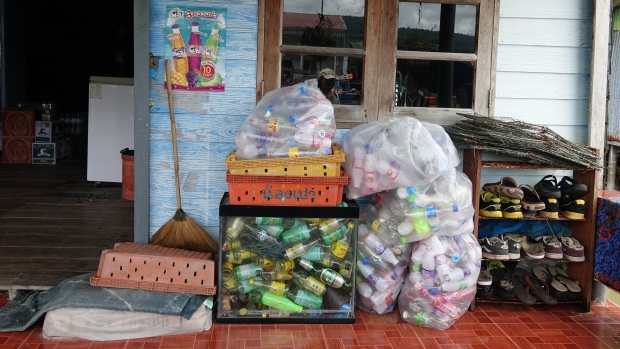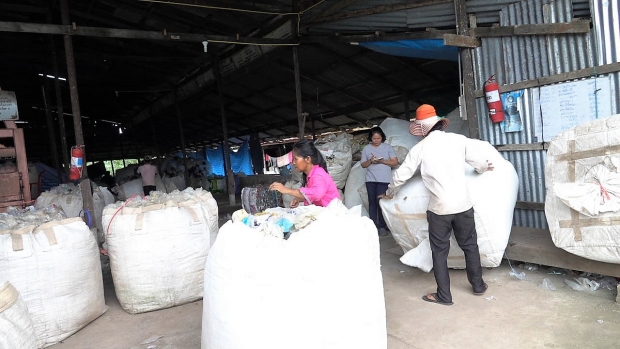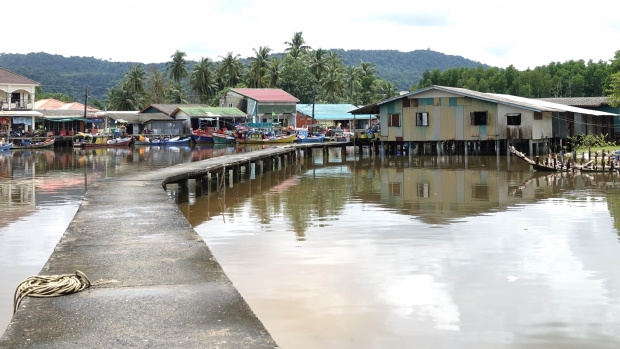Knowledge Hub :: MFF Solutions :: Environment :: Better waste management proves valuable for coastal communities
Better waste management proves valuable for coastal communities

Household recyclable waste, sorted and ready for collection, Thailand © Siriporn Sriaram, MFF Thailand
Coastal communities in Mairood Sub-district face significant waste management issues resulting in general household waste polluting waterways, mangroves and residential areas. Each day over 2 tons of waste are generated in Mairood and whatever is not collected by the systems of the local government ends up in the surrounding environment. Community members are often unaware of the impacts of poor waste management practices, what they can do at a household level to reduce their impacts, and also lack tangible incentives to improve how they manage their waste. In response to this the Community Organisation Council, with support from Mangroves for the Future, implemented a project to raise awareness about waste management practices, and incentivise better waste management at the household level by implementing waste segregation systems that link to market demand for recyclable waste and thus provided additional income for households.
Sustainable Development Goals (SDGs)
Challenges
Poor waste management practices in Mairood impact both the local environment, as it accumulates in waterways and mangroves that surround the community, and the health of local people by polluting water sources and providing breeding habitat for insects such as mosquitoes that are vectors for infectious diseases. Although there are municipal services to collect waste, many households often do not segregate their waste and open dumping is common in public areas. The social challenge is that many people are not aware of simple steps they can take at an individual and household level to improve waste management. Furthermore, there is a lack of incentives for people to change their ways.
Beneficiaries
1,500 households in six village in the coastal community of Mairood sub-district
Building Blocks
Raising awareness
Recycling groups were created among the Mairood community to sort and recycle household waste. Their involvement in this group improved people’s knowledge and awareness about the importance of waste management and the potential value of the different type of waste (e.g. plastic PET bottles, aluminium cans, plastic bags).
Outreach and awareness activities included developing signage around the community to advocate the 3Rs (reduce, recycle and reuse) and community clean ups to reduce waste already in the environment. This built a sense of community responsibility to deal with the issue. These events not only strengthened the waste management capacity of the Mairood sub-district communities, but also served as a platform for other neighboring communities to participate and learn about waste management as well.
Enabling factors
One of the key success factors to raising awareness was that the activities were designed by the community during regular monthly meetings. This gave community members an opportunity to participate in decision making and allowed them to have a sense of ownership, resulting in better participation at the different events. Furthermore, local government authorities also participate in the decision making processes and activities which shows communities that there is political support and recognition of their efforts to address the issue at the community level.
Lessons learned
Collaboration and dialogue between the government officials and the local community members contributed to the success of the awareness activities. The participation of local government officials in the events was crucial to generating interest and commitment within the community throughout the project.
Building local capacity
To build capacity and raise awareness the project implemented training and outreach activities to engage local community members. Training focused on educating communities about the implications of poor waste management and how it can impact their health and the local environment. Trainings were also held to inform communities of simple waste segregation practices they can implement at the household level and how they can take steps to reduce their waste.
Enabling factors
Although there was little community based action before the project, many residents in the community did recognize that something needed to be done. This meant that community members took an active interest in receiving support to address waste management issues.
Lessons learned
Although these communities are now better informed about how they can contribute to better waste management, more needs to be done in neighboring communities to achieve impact at scale. Encouragingly, following the success of the project other local government organisations became aware of the solutions implemented in Mairood, and they, along with neighboring communities, have visited Mairood to learn about what they can do to contribute to better waste management at the community level.
Providing direct incentives to reinforce behavior change
Recyclable items such as plastic bottles, glass, cans or plastic bags can be separated at the household level, collected by the community groups, and then sold on to recycling companies such as Wongpanit. Linking the community groups to a buyer of their recyclable waste provides a direct incentive mechanism that contributes additional income to households and the group, thus reinforcing changes in waste management behavior at the community level.
Enabling factors
Community members already actively participating in waste segregation practices, and an established business in the vicinity of the project area that is already linked to recycling supply chains.
Lessons learned
Supply needs to meet demand to make the relationship sustainable between the community groups selling their recyclable waste and the small business enterprise purchasing it. The community groups must invest time and resources to collect and segregate waste, and similarly the small business enterprise to travel to the village and purchase recyclable waste. If either of these partners fail to deliver on their role in the supply chain, then this can place pressure on the relationship between them and potentially affect the incentive mechanism to improve waste management at the community level.
For the small business enterprise purchasing waste from community groups, their proximity to the next link in the supply chain and on-selling large quantities of recyclable materials needs to be considered. For example, in this case the Wongpanit company expressed some challenges in the economics of transporting recyclable waste to the next link in the supply chain with transportation costs being very high.
How do the building blocks interact?
Raising awareness was the first step needed to generate momentum to implement this project. The activities implemented helped communities be more aware of the impacts of poor waste management and what they can do at a household and individual level to contribute to improving the situation. Activities involving the wider community, such as the clean up events, also helped to build community spirit and a sense of working together to resolve an issue that affects the community as a whole. Building on this increased knowledge and shared sense of responsibility it was then possible to implement training that helped inform people about tangible actions they could take at a household level to both reduce and segregate their waste. This provided a source of recyclable materials that could then feed into an existing supply chain and thus incentivise better waste management practices. Positive and productive relationships between leaders of the community and local government authorities were also key in bringing together these elements to achieve overall success in the project.

Impact
- The community of Mairood is better informed about health and environment issues that arise due to poor waste management practices. They also have increased knowledge of waste segregation practices. Four awareness raising events completed during the project, engaging more than 5,000 people in the community, and 12 signboards advocating for better waste management were installed.
- Mairood community is implementing a system of household waste segregation and sorting, recyclables are then sold onto a merchant earning additional income for families.
- Women are taking a leading role in the integration of better waste management practices, both within the community and also local government.
An Inspiring Story
Waste management is something that the communities in Mairood are now taking seriously, with the topic being brought up every month at community meetings. At these meetings, local schools with activities focused on building awareness about waste management issues are also encouraged to participate and share experiences.
"Waste is a global problem, not just a Thailand or Mairood problem. I have been the mayor for many years and I find this problem to be one of the most challenging to manage,” said Ms. Nutsinee Intaraprasert, Mayor of Mairood sub-district.
“We wanted to work with the villagers to find a solution so we asked them what they needed. And what they needed was projects like this. The MFF project actually helps local authorities achieve their goals in reducing waste disposal. The ultimate goal here,” she added, “is to get every household to manage waste by themselves and give only 20% to the government to deal with.”
The community based waste management activities do not require high-end technology, yet have proven to be effective, and include community clean up events to promote a cleaner environment, establishing recycling groups in each village, and implementing simple waste segregation practices at the household level. Most importantly the project helped link the recycling groups with a small business enterprise that buys segregated recyclable waste from households to then on-sell to Wongpanit, a larger waste recycling company in Thailand. This allows both the members of the community and the company to generate income, while reducing the amount of waste disposed in the local environment.
“There is good money to be made, as we can sell recyclable waste at quite a good price to the large waste recycling company,” said Mrs. Suree Phongsai, CEO of Wongpanit, Klong Yai Branch.
This project has generated a number of catalytic ‘spread-effects’ including a Thai Baht 10 million private sector investment in plastic recycling within one community and increasing adoption of waste sorting by local residents. Peer pressure and strong local government involvement has facilitated almost 100% adoption of waste sorting by local residents. Before the project around 200 kg of solid waste was collected and recycled a month in Mairood sub-district. This figure has now risen to 30 tonnes.

Houses in Mairood sub-district, Mairood subdistrict, Thailand © Siriporn Sriaram, MFF Thailand
Project Facts
Country
Location
Mairood Sub-district, Trat Province, Thailand
Topic
Duration
1st Mar 2016 to 28th Feb 2017
Implementing Partner
Community Organisation Council